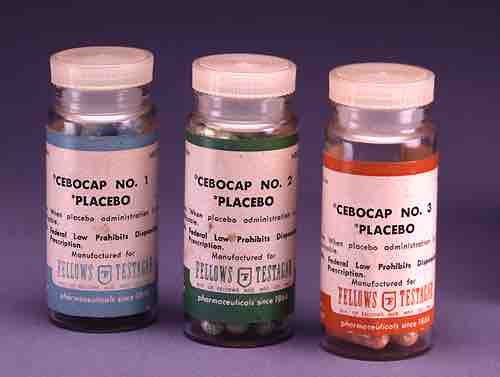Clofibrate (tradename Atromid-S) is an organic compound that is marketed as a fibrate. It is a lipid-lowering agent used for controlling the high cholesterol and triacylglyceride level in the blood. Clofibrate was one of four lipid-modifying drugs tested in an observational study known as the Coronary Drug Project. Also known as the World Health Organization Cooperative Trial on Primary Prevention of Ischaemic Heart Disease, the study was a randomized, multi-center, double-blind, placebo-controlled trial that was intended to study the safety and effectiveness of drugs for long-term treatment of coronary heart disease in men.
Placebo-Controlled Observational Studies
Placebo-controlled studies are a way of testing a medical therapy in which, in addition to a group of subjects that receives the treatment to be evaluated, a separate control group receives a sham "placebo" treatment which is specifically designed to have no real effect. Placebos are most commonly used in blinded trials, where subjects do not know whether they are receiving real or placebo treatment.
The purpose of the placebo group is to account for the placebo effect -- that is, effects from treatment that do not depend on the treatment itself. Such factors include knowing one is receiving a treatment, attention from health care professionals, and the expectations of a treatment's effectiveness by those running the research study. Without a placebo group to compare against, it is not possible to know whether the treatment itself had any effect.
Appropriate use of a placebo in a clinical trial often requires, or at least benefits from, a double-blind study design, which means that neither the experimenters nor the subjects know which subjects are in the "test group" and which are in the "control group. " This creates a problem in creating placebos that can be mistaken for active treatments. Therefore, it can be necessary to use a psychoactive placebo, a drug that produces physiological effects that encourage the belief in the control groups that they have received an active drug.
Patients frequently show improvement even when given a sham or "fake" treatment. Such intentionally inert placebo treatments can take many forms, such as a pill containing only sugar, a surgery where nothing is actually done, or a medical device (such as ultrasound) that is not actually turned on. Also, due to the body's natural healing ability and statistical effects such as regression to the mean, many patients will get better even when given no treatment at all. Thus, the relevant question when assessing a treatment is not "does the treatment work? " but "does the treatment work better than a placebo treatment, or no treatment at all? "
Therefore, the use of placebos is a standard control component of most clinical trials which attempt to make some sort of quantitative assessment of the efficacy of medicinal drugs or treatments.
Results of The Coronary Drug Project
Those in the placebo group who adhered to the placebo treatment (took the placebo regularly as instructed) showed nearly half the mortality rate as those who were not adherent. A similar study of women found survival was nearly 2.5 times greater for those who adhered to their placebo. This apparent placebo effect may have occurred because:
- Adhering to the protocol had a psychological effect, i.e. genuine placebo effect.
- People who were already healthier were more able or more inclined to follow the protocol.
- Compliant people were more diligent and health-conscious in all aspects of their lives.
The Coronary Drug Project found that subjects using clofibrate to lower serum cholesterol observed excess mortality in the clofibrate-treated group despite successful cholesterol lowering (47% more deaths during treatment with clofibrate and 5% after treatment with clofibrate) than the non-treated high cholesterol group. These deaths were due to a wide variety of causes other than heart disease, and remain "unexplained".
Clofibrate was discontinued in 2002 due to adverse affects.

Placebo-Controlled Observational Studies
Prescription placebos used in research and practice.